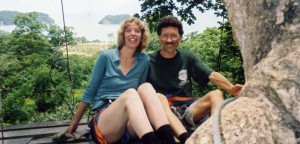If you’ve ever wanted proof that a lucrative writer’s life can be born out of sheer determination, look no further than Kelvin Parker.
Kelvin is the ultimate entrepreneur. He takes big risks, and gets big payoffs. And, he’s a genius at making money, as his 30-year career working with some of the biggest names in the business attests.
Kelvin is a guy who finds it easy to “sell money” (that is, money-making opportunities), and gets a lot of fun out of it. And there’s not much that daunts him. Ready to make a transcontinental move on a whim? Let’s go. Need $100,000 to fly a film crew to India? No problem.
In our interview, Kelvin generously shared some of the best advice I’ve heard about charging high fees and succeeding as a Barefoot Writer — a life he was enticed to by an underground movie theater in Portugal, of all things.
Kelvin also shared his secret to avoiding the “deflated balloon” feeling writers sometimes deal with, as well as how to overcome it and make serious money at the same time. You’ll also learn why he was recently serenaded by over 200 orphans in India.
I’m fortunate to have met Kelvin personally, at one of AWAI’s annual Bootcamps. His friendly manner and perpetual smile make him easy to talk to. As it turns out, I think both of those qualities — plus steadfast tenacity — are what propelled him to the top of the copywriting world.
Read Kelvin’s personal story and you’ll learn some incredible ways to move your own career forward — like which major money-making wave new writers should catch right now, and why it’s smart to move to “performance” deals as quickly as possible.
I spoke with Kelvin from his home in Colorado. It was a sunny Friday afternoon, and he had just finished a jam session on his guitar.
Enjoy the following account of Kelvin’s path to ultra-success as a Barefoot Writer.
***
Hi, Kelvin! Let’s jump right in. Tell me how you got started writing for a living.
Well, that’s a book in itself. I was living in Australia in my early twenties, when I got a piece of direct mail one day (even though I didn’t know it was called direct mail) selling a Self-Help product that taught you how to really excel in life. The headline was “The Most Important Money, Power, Romantic Love Discovery since the Industrial Revolution.”
I thought, “Great! Now I can make all the money I’ll ever need and focus on becoming Eddie Van Halen the Second!” So I bought the thing. And while my dreams of becoming a musical rock star didn’t quite pan out, I still felt it was a great product, and thought of a way the company could sell even more. On a whim, I contacted the company and volunteered to re-write the piece so it’d be more tailored to the Australian market.
I still picture them laughing around the boardroom table when they got my letter. But one of them took my challenge and basically said, “Sure, knock yourself out!” They agreed to pay me a share of every sale if it worked.
I knew nothing about copy — I didn’t even know what copy was! But three friends and I pooled our money together — we paid all our own costs — and mailed it out. I even had it printed it on bright blue paper.
It went to about 2,000 people … and we only got one response. It wasn’t even an order — it’s what’s called a non-order in direct mail — from this fellow who wrote a long ranting letter telling me how evil I was, and a lot of other things that still give me a good laugh. So that was my first experience in direct marketing.
How on earth did you recover from that?
Not to be discouraged by the failed sales letter, I went back to the company and asked if I could do a seminar format instead. They said yes, so my friends and I put together a seminar in Sydney about this company’s products. We had 30 people show up and gave four talks, and then we had a roundtable dinner. We sold $3,000 worth of product.
I thought, “Wow, this is awesome!” So I jumped on a plane and came to America. I went to the company and said, “How about I do seminars for you here in the United States?” Again, they said yes.
I wasn’t working for this company — just attempting to write copy for them and hoping my seminar idea would work in America. They let me start by writing a mailing piece for a seminar to be held in Long Beach, California. So I’d write copy, and they’d give it to their copywriters who would then destroy it. At the time, this company had three of the best copywriters in the business working for them. They mailed hundreds of thousands of pieces each week. They even had a control piece in the mail that had been beating all the competition in the self-improvement niche for over a decade.
But I didn’t know any of this. I didn’t even understand it. So, I wrote my piece and they gave it to the top copywriter. He totally destroyed it with a red pen and gave it back to me and told me to redo it. We went through this about a dozen times, until I finally said, “Well, you’ve totally changed my seminar … ” And he goes, “That’s the whole point, isn’t it? What will sell is what dictates your product, and not the other way around.” So that was lesson number one for me.
Driving over 2,000 lbs of books from Las Vegas to Long Beach, CA for the event turned my car into an instant “low rider”. The seminar, by the way, made $23,500 and one of my favorite photos is of me counting all the cash after the event.
But I still wasn’t a copywriter. I actually started working for the company — but in the Customer Service department. From there, I went to Product Fulfillment and handled all the grunt-work they could throw at me. After just four months, though, I’d worked my way up to its International Marketing Director. We were marketing in over 200 countries and 12 languages. I don’t think they ever knew my background — that I’d been to college and all. Everything was based on my own initiative.
At some point, I did write one mail piece on my own and actually framed my first order and stuck it on the wall. After leaving the publishing company, I became an independent consultant and ran complete marketing programs for other companies.
What was interesting about that role?
I got to meet a lot of people from all over the world. One of them was a previous partner to Gene Schwartz — Christian Godefroy — whom I got to sit next to at this event. Christian was French — he’s a brilliant copywriter, and he used to run all of Gene Schwartz’s stuff in Europe, while Gene ran all of his stuff in America. I asked him, “How much did your best piece make for you?” and he told me $90 million dollars. Then we chatted, and I was so enthralled by his lifestyle — which included a walk-in movie theater underground in his Portugal house — that I thought to myself, “Hmm, I think I would enjoy that kind of life.”
So I decided I should be a full-time copywriter. Eventually I was doing projects for Jay Abraham and Agora and Early to Rise, and then I’ve done projects for infomercial companies that did over $100 million a year. I even scripted and appeared in an infomercial. So that’s the short answer to how I got started.
What’s your favorite type of copy to write?
You mean niche? Well, it’s money — but not financial, as in what stocks to pick and things like that. And I don’t mean cheap, nasty, and fraudulent business opportunities either, where you supposedly can make millions in your PJs from home doing virtually nothing. I mean real and proven systems that people can use to make more money. So, maybe someone who’s a trader needs a system to help them trade better, for example. Or maybe it’s a marketing system that will help a business bring in more customers.
I find it very easy to sell “money.” It’s very easy to get people to pay money in order to get more money. So I like writing for that financial niche.
I also have quite a history with self-help and self-development. In fact, I’ve worked with Dr. Robert Anthony, who is the acknowledged inspiration behind the movie The Secret. I wrote a campaign for him and one of the early orders was from copywriting legend Gary Bencivenga. I told Gary, “You didn’t have to buy that — I would have given it to you for free!” But he said with copy that good, it was worth paying for.
That’s some high praise! Clearly, you found your calling with copywriting. Can you tell me more about the copy that relates to your recent birthday serenade?
In 2003, I had a client in Australia who was sold forecasting systems for trading stocks. And in fact, I got this client through Jay Abraham. So, my client’s company was supporting an orphanage in India called Hebron Orphanage. And he decided he wanted to teach these orphans how to trade so they could make money for the orphanage. After all, they only needed a basic computer to use the software, which they had.
It was way overly ambitious to think he could teach orphans in India to trade Wall Street, especially when even very smart people who are well-trained and English-speaking lose all their money 95% of the time.
But he wanted to try, and he wanted to film his visit to the orphanage.
However, to take the whole film crew from Australia over to India was going to cost a lot of money. So I wrote some sales copy that generated the $100,000 needed to pay for the film crew to go to India. I also went on the trip, along with my wife.
We were there for six days, and you know, it’s like nothing I’ve ever experienced before. We first arrived in Chennai where I believe the population is something like 4 million. We visited the sewage and storm water drains — and there were hundreds of kids right there, living in the storm water system — living off of their street smarts. See, there’s no support structure for these kids. They’re just left to fend for themselves.
We went up to the orphanage, which is in a rural area near a little city called Palakol, in Andhra Pradesh. It’s a very tough way of life. Next door was a leper colony, which we visited.
But then you get there, and the kids are like the happiest kids on the planet! I mean, they have nothing. Their personal possessions consist of a steel plate that they use for all their meals. Nobody has their own cup. There are hundreds of kids and they all share one cup, and it’s not allowed to touch their lips. I think they’re allowed to go to the drinking quarters a few times a day, which is crazy because it gets up to 50 degrees Celsius in the summer — I think that’s over 120 degrees Fahrenheit.
So they each have a steel plate they keep under their beds, and they might have three or four other things and they have two outfits a year. And they basically squeeze three to a bed — they all sleep in bunk beds. So they have no personal space and everything’s in the open — they have no doors. It’s very tough.
And yet, they’re so happy. I remember one of the guys from Australia brought the boys a new cricket bat and they were over the moon. It was like heaven to them.
Did the orphanage have any success using that forecasting system?
They kept trying to learn it for about six months before stopping.
Well, you never know until you try! Now, it’s been nine years since you first visited. Have you stayed in touch with the orphanage all this time?
My client supported the orphanage for quite a few years, but now he’s passed away. But I’ve stayed in touch with Sagar, the fellow who runs the place. We met when I first visited. He’s run the place his whole life. His father started it and then he took over.
Sagar told me they’ve lost all funding, and that t starting to sell off what they have in order to survive. He asked if I could help, so that’s what I’m doing. We’ve got a Facebook fan page, and we just got a web page and a donation page up. We’re trying to get fans using videos to try to raise some money so they can give back to the kids and hopefully even bring back the 165 kids they’ve had to send away.
So anyway, last month they surprised me when the orphanage called me through Skype and over 200 orphans sang me Happy Birthday. It was totally unexpected.
What an incredible story — and a privilege to be involved in something like that. Now would you please share your advice to someone just starting out as a writer?
Well, not to sound cliché, but don’t write about things you have no interest in. I’ve written for areas I absolutely don’t like, and though I made the client millions of dollars, I couldn’t have stuck with it for the long-term. When I worked on those projects, I’d have to psych myself up in the morning and say, “I love this. I love this. I love this.” Then I’d work on it for ten minutes, and then I’d feel like a deflated balloon and I’d have to pump myself back up again. “I love this. I love this.” And I’d maybe get another 15 minutes out.
You can’t stick with something like that. So you should get really good at writing about something you’re passionate about. But remember, it’s still business. You have to make sure there’s a market, and by that I mean a market that’s spending money. Because if you’re passionate about, say, wicker chairs, then there’s probably a little bit of a market but not a lot of money being spent.
Any final tips?
Move to a performance stage as quick as possible. That basically means you get payment based on the sales results of your copy — like royalties — as opposed to basic fee-for-service.
If you’re just getting started and you’re scared of that, then do some writing on a flat fee … but you know, don’t do that longer than a few months — three or four months, tops. And then, once you’ve got a few projects and even if you’re not confident, just jump off the cliff. Here’s a story for you to summarize that point:
When I started doing copy, I was charging flat fees. I got up to $6,000 per project. So I quoted one fellow $6,000 and he said, “Well, maybe not yet. Maybe I’ll come back to you a little later.” I said okay. And then I started charging fees based on performance. I knew I could make more money that way, since my copy was performing very well in the market.
So this guy comes back to me a few months later and says, “I really want to get some copy done — wasn’t the price $6,000?” And I go, “I don’t do that anymore. I only do performance.”
The truth is, I had no projects at that time and I really needed the money, but I said to him, “I’m totally booked and I only do performance for this kind of sales letter: 10 percent of gross for the lifetime you use my copy. Do you want me to do it? I’ll get started. If not, that’s fine. Have a nice day.”
He said, “But you were going to do it for $6,000!” I said, “I’m sorry, but I’m really in demand and now I only do performance.” It ended up that the copy I was going to write for just $6,000, I wrote, and over the course of two years, it earned me $200,000.
So I say, jump off a cliff. You don’t have to be confident. You just have to fake confidence and go to pay-for-performance.
I definitely agree that it’s best to just go for it. And that’s a great example of how royalties can give copywriters an incredible, long-term payoff. Do you have any closing comments on the future of the writing industry?
I’ve been in direct marketing for 30 years and I’ve seen a lot. But if you had asked me three years ago about social media, I would have said that’s a nice way for people to pass their time, but it seems like a bit of a waste for business. You couldn’t track anything and there was no ROI.
But at this point, I really feel that social media has come of age. I really think that social media is the biggest paradigm shift in direct marketing in 100 years. And the reason I believe that is because everything prior to social media was “push marketing.” We’re pushing direct-mail pieces at people, we’re pushing print ads even when you don’t want them. We’re shoving commercials in people’s faces even when they don’t want them.
Well, social media is the first time I’ve seen a medium of marketing where it’s truly in sync with human nature. Human nature is to be social. We are social beings. We want to be social, we have to be social. And the reason Facebook now has over 12% of the planet signed up as members and the reason it has grown so fast is because it answers the bane of human existence, which is loneliness. And it answers in a way that nothing else does because most people are naturally shy and nervous about talking to people they don’t know.
But online, all that fear is gone. So it answers their loneliness and it takes away all their inhibitions.
But the biggest point is – social media is coming of age when it comes to marketing. Over 1 billion people, and all of their interest areas are tracked, and as a marketer, one can select and segment by almost any interest area, passion or problem. So I think any copywriter that can attach themselves to the social media waves, they are going to be catching a wave which is just taking off and it’s going to ride out for decades.
Kelvin is always happy to hear from other copywriters, and can be contacted at kelvin@parkermarketing.com






